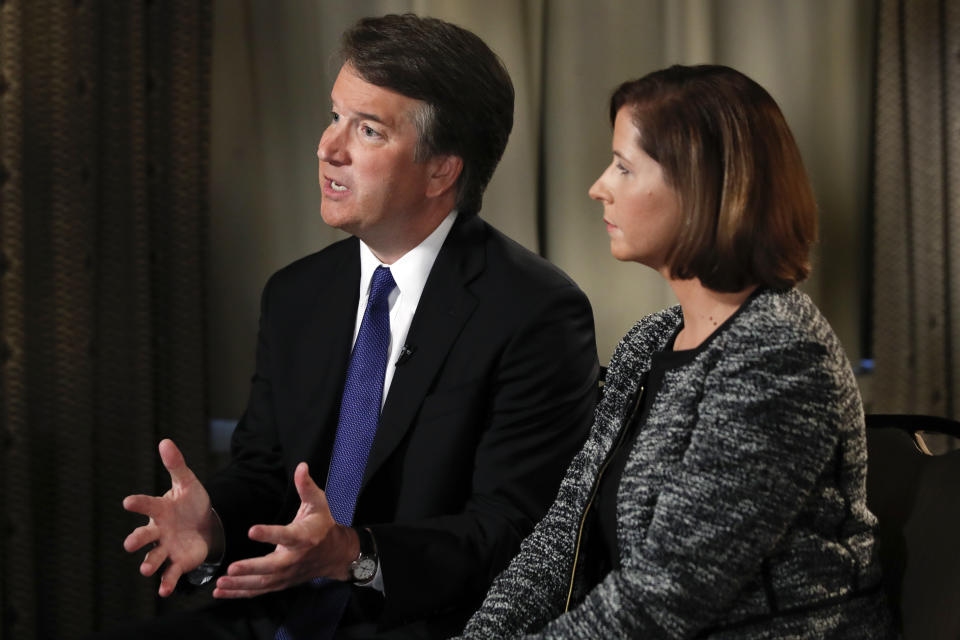Why Kavanaugh's virginity and alleged assaults are 'not mutually exclusive'
Supreme Court nominee Brett Kavanaugh‘s latest defense against the sexual assault allegations against him is that he was a virgin in high school and college — an argument that has been met with a swift and angry backlash on social media. Many have pointed out the obvious: that a person who is a virgin can nevertheless violate another person’s sexual boundaries.
Kavanaugh told Fox News host Martha MacCallum on Monday, “I’ve never sexually assaulted anyone. I did not have sexual intercourse or anything close to sexual intercourse in high school or for many years thereafter.”
“Through all these years that were in question, you were a virgin?” MacCallum clarified.
“That’s correct,” he said, adding that he did not have sex until “many years after” college.
A flurry of tweets are now taking Kavanaugh to task for his comments, stressing that an individual’s level of sexual experience has no bearing on their capacity to commit unwanted sexual behavior. Two women, Christine Blasey Ford, who is set to testify about the incident on Thursday, and Deborah Ramirez, who spoke with The New Yorker, have alleged that they were sexually assaulted by Kavanaugh.

The tweets challenging Kavanaugh called his virginity defense a “non sequitur,” arguing that it reveals “a lot about how he views women even beyond his guilt or innocence,” and countering that his virginity and the allegations of assault are “not mutually exclusive.”
Kavanaugh says in the Fox interview that he was a virgin throughout high school so I'm just gonna leave this here https://t.co/rjKnc5vgTp
— Jessica Valenti (@JessicaValenti) September 24, 2018
Brett Kavanaugh being a virgin through college AND trying to rape Christine Blasey Ford AND also putting his penis in Deborah Ramirez's face are not mutually exclusive. https://t.co/q23fDxGqem
— Matt Wilstein (@mattwilstein) September 24, 2018
The topic of Brett Kavanaugh’s high school virginity is a non sequitur. Perhaps he knows that. I actually hope that he does. It would be disqualifying on its own if a Supreme Court Justice didn’t know the difference between intercourse and sexual assault. https://t.co/CBqOmjG0vZ
— Jamil Smith (@JamilSmith) September 25, 2018
The fact that Brett Kavanaugh thinks "I was a virgin" would exonerate him from sexual assault says a lot about how he views women even beyond his guilt or innocence.
— Matthew Chapman (@fawfulfan) September 25, 2018
My cousin who molested me was a virgin when he did it……
I'm waiting for a valid point to come out of #Kavanaugh but nah.— Laurie Bertram Roberts🏳??🌈???🏾 (@smartstatistic) September 25, 2018
Kavanaugh has been accused of exposing himself to one woman and pinning another down while trying to disrobe her.
Being a virgin wouldn't disprove either of those allegations. https://t.co/oqztw1RpYY
— Alexi McCammond (@alexi) September 24, 2018
i don't give a shit if brett kavanaugh was a virgin. my sexual assault did not include penetrative sex.
— Molly Gingrich (@mollygingrich) September 25, 2018
“It doesn’t necessarily matter what the specific behavior committed involved, as there are many ways you can violate a person’s boundaries and bodies without consent,” Laura Palumbo, communications director for the National Sexual Violence Resource Center, tells Yahoo Lifestyle. “What we use to define sexual harassment, assault, and abuse is a lack of consent — not whether there was vaginal penetration or a certain act committed, but that there was sexual contact without consent. … It’s about taking away a person’s power by not respecting their consent.”
Palumbo adds, “Virginity is, in many ways, a cultural construct that’s used as a marker of status when it comes to sex.”
Kavanaugh’s invoking his virginity as an attempt to absolve himself from blame reflects a context where victims’ perceived level of sexual experience is often used against them.
“What’s interesting about our culture’s concept of virginity is that it’s wrapped up in purity, respectability, and worthiness. … So there’s this underlying sense that the status of your virginity affects the purity of your body, its worth, and its right to be respected,” Palumbo explains. “That’s what women face when their virginity status is used as a tool against them.”
But, she stresses, “It has no bearing on the ability to commit sexual assault — or be a victim.”
Read more from Yahoo Lifestyle:
? ‘You’re a repulsive human’: Donald Trump Jr. receives harsh criticism after seemingly mocking Kavanaugh’s sexual assault accuser on Instagram
? Experts weigh in on judging Kavanaugh for alleged adolescent behavior: ‘Most teens don’t do that type of thing’
? ‘We believe Christine Blasey Ford’ was the message of the national walkout. Here’s what it looked like across the U.S.
Follow us on Instagram, Facebook, and Twitter for nonstop inspiration delivered fresh to your feed, every day.

